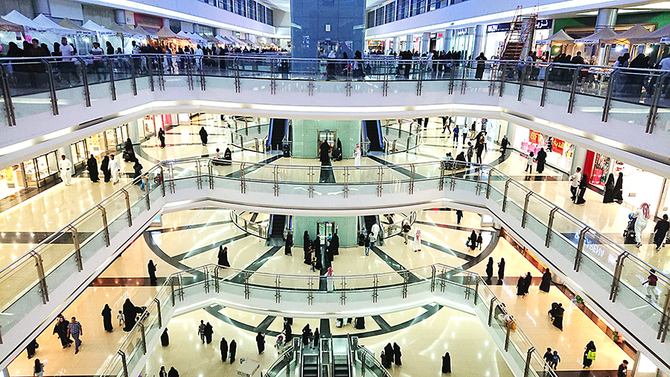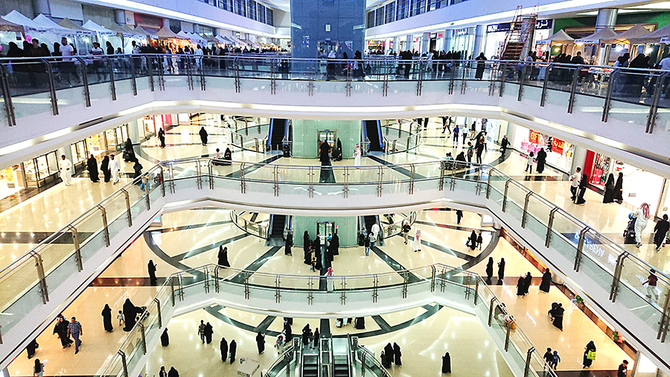JEDDAH: One of the clearest signs marking the arrival of Ramadan is the shopping behavior of Saudi residents, with people flocking to supermarkets and malls to prepare their households for the upcoming holy month.
Last year’s buying sprees were different during the coronavirus disease (COVID-19) pandemic lockdown, where consumers resorted to shopping online for groceries, clothes, and necessities.
Due to the restrictions, sales were hit hard. This year, shopping malls and hypermarkets in the Kingdom have started to recover from the economic recession.
It has become a habit to prepare for Ramadan with a feeling of newness: Households go on a cleaning frenzy, decorate the house, reorganize furniture, take away some goods to give to the poor, and of course, buy new items.
For consumers in the Kingdom, the shopping process becomes more intense unlike any other month of the year. People head to grocery stores to shop for products, sweets, new kitchen utensils, furniture, toys, and of course holy month decorations to fully enjoy the Ramadan vibe.
Hypermarkets and shopping malls accommodate the shopping frenzy with creative marketing schemes and displays to catch consumers’ attention before the month even begins.
Sellers from different markets — ranging from hypermarkets to bakeries and general goods — have provided an overview of buying behavior before and during Ramadan, with some consumer experts saying that purchasing decisions have become more prepared after the pandemic.
Raghdah Sadiq, marketing supervisor at a Saudi eCommerce platform HNAK.com, told Arab News that “by limiting the customer to only order online, the customer missed the actual experience of going to the mall and interacting with other people to buy or exchange.
“In 2021, consumers have already built a strong habit of ordering online, but for some items such as fashion, jewelry, and groceries, people would prefer to go to the stores and experience shopping offline.”
Panda Hypermarket, a Saudi Arabian retailing company and one of the Kingdom’s largest grocery store chains, buckles up for Ramadan over a month ahead of its arrival.
“We prepare everything very early to beat the crowd. We provide all Ramadan food supplies a month and a half in advance until the end of Ramadan,” said Hussein Al-Harbi, the on-duty manager of Hyper Panda in Jeddah’s Al-Ruhaily neighborhood. “We also add more employees before and during Ramadan to accommodate the growing crowd of shoppers.”
Al-Harbi added that while some consumers are used to moderately buying the exact amount of groceries they need, many tend to go overboard with food purchases. During the lockdown, however, people had to consider what they actually needed, which made them develop smart shopping skills and an understanding of their required consumption.
Ahmad Al-Muqbil, managing director of Creative Team, a marketing company based in Saudi Arabia, told Arab News that “companies tend to come up with promotions to their products and more special offers to gain consumer loyalty.”
He added: “Despite the pandemic and the setback in 2020, everyone continued to shop through apps and websites. However, the proportion of shopping was the lowest ever over recent years.”
Essentials, desires, and advertisements
Ramadan products are promoted not only via shopping malls, hypermarkets, and ads, but also with the help of social media influencers in the Arab world.
“Building that sense of urgency completes other companies’ agendas, for example your dinner table will not be ready unless you have a certain product,” said Sadiq, adding: “Consumers have the need of not missing out on the occasion as Ramadan is mainly about gatherings in the family home.”
Mansour Turki, an employee at a local pastry shop, told Arab News that Eastern pastries and deserts such as baklava, kunafa, and basbosa are high season picks during Ramadan and customers flock to their stores on weekends. Though the lockdown did affect his sales, it is still expected to be business as usual for this coming Ramadan.
Neama Fadhel, a housewife and a mother of five children, said that she likes to plan for her Ramadan shopping for kitchen products, accessories, and clothes, as the experience brings her joy.
Fadhel also takes happiness from buying new items for her household, especially her kitchen, as it “gives me a boost for the daily cooking routine in the holy month that differs from other normal days of the year.”
She added: “This year has made a big difference in my preparation for Ramadan as there will be an opportunity for us to enjoy breakfast with family and friends.”




























